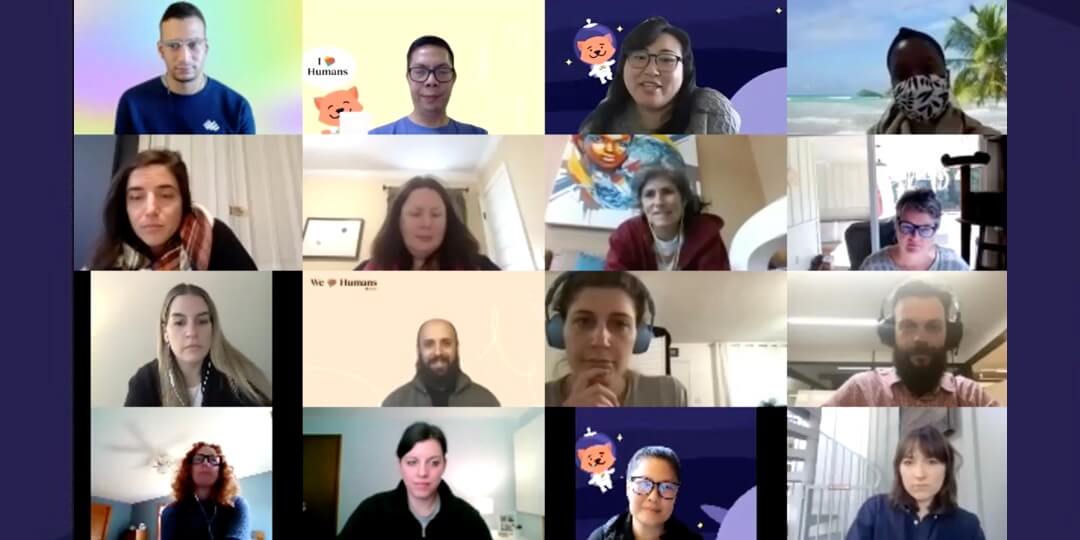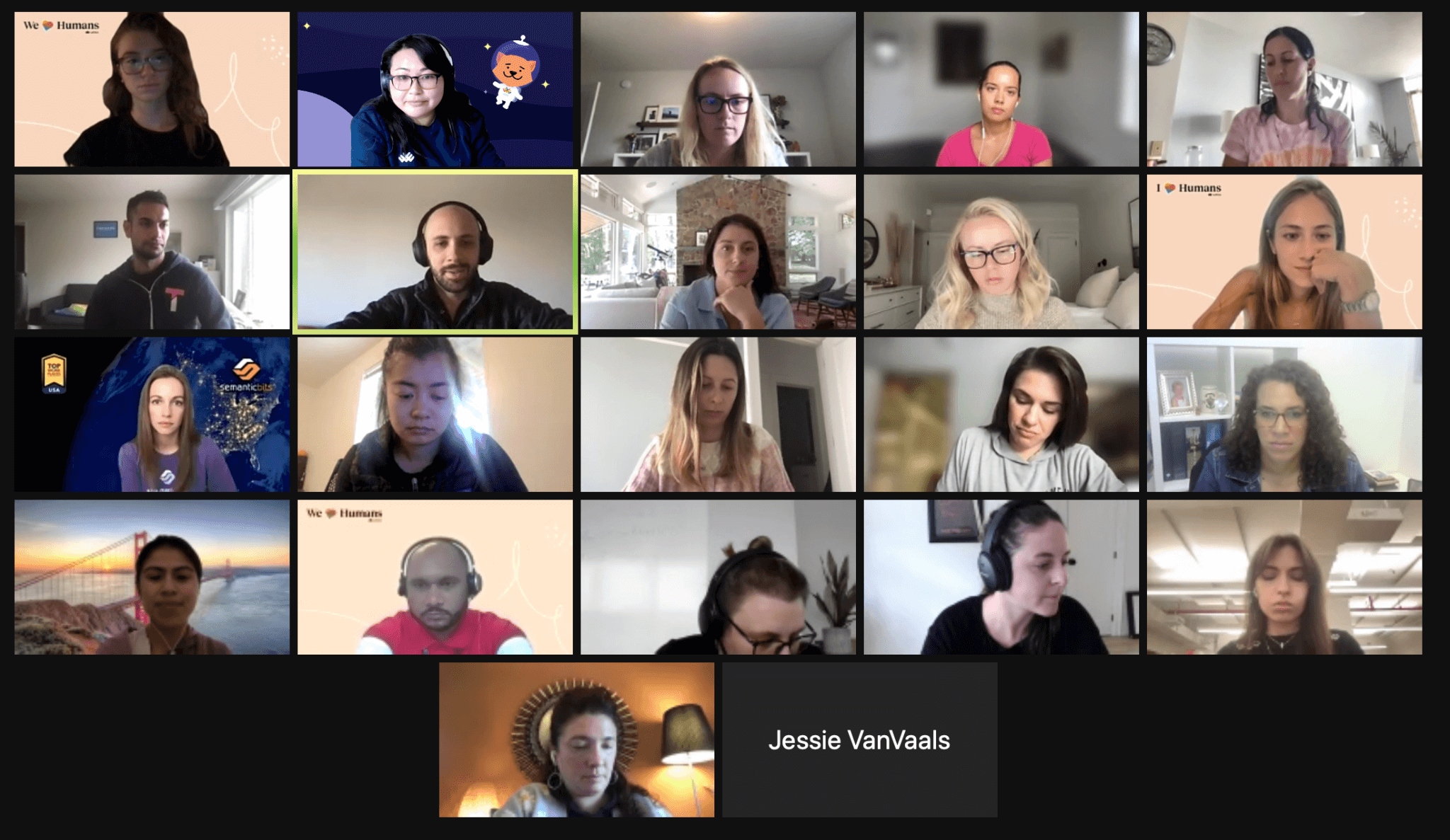As HR leaders start planning and setting goals for the year ahead, they’ll be looking back at the last twelve months. What lessons or takeaways from 2020 will influence decision making moving forward? What new People strategies and lessons-learned will make 2021 better than the historically bad year that preceded it?
Resources for Humans (RfH) is a Slack community of over 10,000 HR leaders. The community recently hosted a virtual working session for members to share what they each started and stopped doing in 2020, and how those decisions could influence 2021 planning. Here are some of the workshop’s key takeaways.
Building a Remote Tech Stack
HR teams had to pivot quickly during this year’s pandemic, as many companies went completely remote overnight. Community members shared how they evolved their existing tech stacks to support employee collaboration, engagement, and wellness — and how most of those new tools would continue to be relied on well into the new year.
“We were already a remote-first company, but I think one of the biggest things that we did was re-evaluate our technology. We made sure that we implemented technology that actually integrated and spoke to each other.” - Amna Pervez, VP of HR at Collaborative Imaging
“People are struggling to unplug because we're all at home. We can't go anywhere. So, if you need a tool to just start creating more communication within your team, Donut has been a phenomenal tool that has gotten just an amazing response from my company.” - Jenna Bachrouche, HR, People, and Talent Lead at Passbase
“We brought in a lot more support around wellness and mental health...We rolled out a number of initiatives, including giving everybody the choice of a subscription to either Calm or Headspace. We also began a partnership with Modern Health.” - Naomi McQuaid, Director of People at Humanity United
Staying Flexible With Goals and Expectations
An important part of facilitating employee wellness is being realistic about what you expect from your people. This year forced leadership teams to take a hard look at performance expectations and goals, readjusting as needed. With so much uncertainty ahead, community members expected this empathetic, flexible approach to business to continue next year.
“Our leadership team sat down and looked at our organizational goals for the year, which had only been finalized a week before — and then COVID happened. We pretty much had to really take a hatchet to the plan and focus on only the most important things. We've really prioritized, front and center, looking after our people and looking after our partners.” - Naomi McQuaid, Director of People at Humanity United
“We stopped doing anything that was manual and that we could automate, and that gave us time and energy back to redistribute and repurpose in other areas that provide much higher value.” - Amna Pervez, VP of HR at Collaborative Imaging
Fostering Connection
This year, HR teams received a crash course in how hard it can be to keep remote teams engaged. Community members discussed the struggle of introducing new ways to connect beyond virtual happy hours. Some shared that empowering employees to own planning and content can make for creative events like “Masterclasses” that spotlight hidden talents and hobbies. With many employees staying remote in the months ahead (or even permanently), many of these will continue in 2021.
“We introduced different ways for people to come together. We've got a group lunch program, where we expense lunch on the company. We've also had daily virtual watercoolers...But what's been really great is that the team has been very creative in finding ways to facilitate connection on their own accord.” - Naomi McQuaid, Director of People at Humanity United
“One of our most successful events is a ‘Masterclass’ series, where we ask someone who has expertise in something to present to the whole company. People have loved these. We had someone whose partner is importing coffee and starting a coffee shop in Austin, and they spent an hour talking about everything from selecting beans to brewing. We also had someone who's a DJ, and she demoed how to compose a playlist.” - Stephani Martin, VP of People at Affinity
Updating Workdays and Norms
HR leaders also saw the average workday evolve to adjust to the realities of remote work. From “no-meeting days” to flexible scheduling, these updated workdays looked different across companies. For these new norms to endure into next year, community members believed it was critical for managers to be on board and lead by example.
“We actually scaled back our team huddles. On Mondays and Fridays, we just took them off the calendar — and we saw really good feedback. People felt they could take a day and work solely on their own projects and things that were coming up.” - Jessica Correia, Regional Manager, Talent Acquisition at Retail Zipline
“While we can come up with all these lovely events and stipends, if managers or leaders keep overloading people with work they’ll have no time to enjoy any of those perks. Then it's a moot point no matter how brilliant the idea is — people are not going to go.” - Garima Gupta, Director of HR at The Fund for Global Human Rights
“We've changed our meeting schedule pretty significantly and we now have offline Fridays. It’s very, very rare to find anybody having a meeting on a Friday unless it's something super urgent. So Friday is a day that I know that I'm not going to be asked to go into a lot of meetings. So that's been really helpful for us.” - Julia Thibaud, Program Associate at AI Now Institute
Empowering Employees to Open Up
Along with a global pandemic, employees had to grapple with current events like the murder of George Floyd, a presidential election, wildfires, and more. HR teams had to accept that current events couldn’t be kept “out of sight, out of mind,” and gave employees room to open up about those challenges beyond this year.
“Before, there was never space where we could talk about feelings, and how things were making us feel in the world...Our meetings were very company-driven and very business-oriented. So now we're creating these spaces using Zoom to allow people to speak up in the larger sense of things.” Hildi Cano, Director of People Operations at LeafLink
“[We want to] continue to support and foster a culture of empathy. In HR, we do a lot of compliance, ‘legal schmiegal’ stuff. And then at the other end, there's still the business to run. This year taught us that everyone is dealing with this in a different, unique way based on their personal situation. And if we can find that flexibility and be empathetic and still get the business done, that is what we want to continue.” - Allison Twyeffort, HR Operations at MachineMetrics
Those are just some of the insights shared during a recent Resources for Humans virtual working session. If you haven’t already, join the over 10,000 HR leaders that make up our Slack community.







